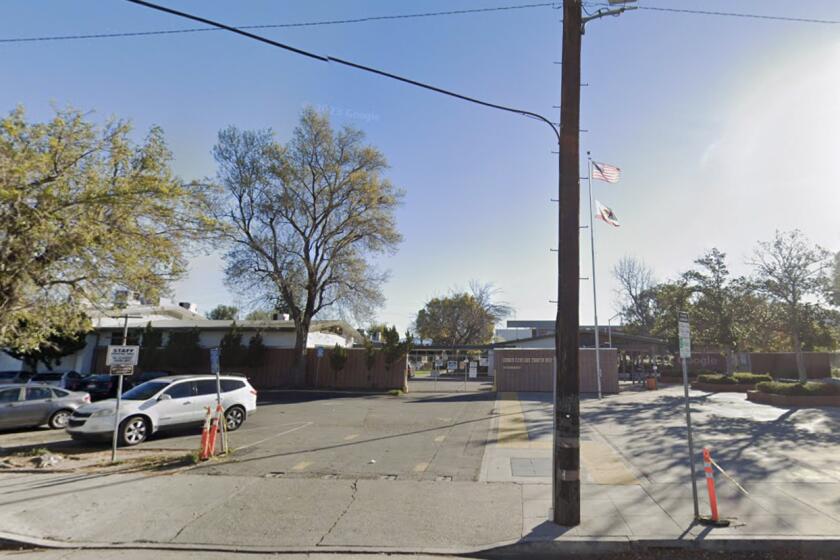There’s revenue in those hills -- and offshore

Republican politicians want to drill offshore. Democrats want to tax oil onshore. Both sides are right.
And both sides are wrong because they basically oppose each other’s position, especially in the state Assembly.
In the Senate, there was enough Democratic support two weeks ago at dawn after an all-night session to authorize new offshore drilling in the Santa Barbara Channel. It would have earned the cash-strapped state $100 million this fiscal year -- an estimated $1.8 billion over the next 14 -- and required only a simple majority vote. But nine hours later the bill was buried in an Assembly sump hole.
Last December, Gov. Arnold Schwarzenegger proposed an oil severance tax on most onshore production, a revenue-raising tool employed by every other major petroleum state. He pegged the year’s take at $855 million, but dropped the idea when Republicans protested. Democrats picked it up, but the tax would have required a two-thirds vote and the GOP balked.
Democrats have been anti-offshore drilling zealots for 40 years, ever since a platform off the Santa Barbara coast spilled goo all over 20 miles of beaches. Never mind that new technologies have made offshore drilling much safer today.
Wishful thinkers also fantasize that if America stops producing oil, we’ll quit burning it and climb into golf carts. That will happen when electric cars become practical and affordable. Meanwhile, the nation will continue to shape its foreign policy to assure a steady stream of tankers from shifty overseas sellers.
If we’re going to keep using oil -- and we are -- we should produce it ourselves. Keep the money in our own economy and away from terrorists.
As for Republicans, their anti-tax crusade began with the Proposition 13 property tax rebellion 31 years ago and they’ve gradually become fanatics. When the two GOP legislative leaders dared to team with the Republican governor in February to support a temporary tax hike in exchange for fiscal solvency and permanent spending controls, they got dumped by their party colleagues.
But with the red ink only temporarily stanched in Sacramento -- that’s everybody’s expectation -- the governor and Legislature soon will resume quarreling over spending and taxes. And once again on the negotiating table will be offshore drilling and the oil tax.
Liberals complain about Schwarzenegger closing 100 state parks. They also protest his vetoing of money for abused and neglected children, poor kids’ healthcare, domestic violence prevention and services for the elderly. And those were just the final cuts among roughly $30 billion this year.
The $100-million oil deal might seem like chump change. But it could have saved the parks ($14 million), the program for abused and neglected children ($80 million) and community services for the elderly, including Alzheimer’s patients ($4 million).
Conservatives scream about releasing prisoners. Schwarzenegger and legislative leaders, trying to close a $26-billion deficit, agreed to save $1.2 billion in prison money. The governor’s plan was to release 27,000 “non-violent” inmates from prison cells. Republicans cried foul. So everyone agreed to count the savings, but -- no surprise here -- procrastinate over how to actually achieve it.
About $900 million from an oil severance tax could keep those felons behind bars.
Three federal judges, in ordering the state Tuesday to ultimately reduce its grossly overcrowded prison population by nearly 43,000 inmates, articulated the problem: “The convergence of tough-on-crime policies and an unwillingness to expend the necessary funds . . . has brought California’s prisons to the breaking point.”
Bulging prisons, failing schools and declining healthcare for the poor all directly relate to the politicians’ and voters’ failure to raise enough revenue to pay for the programs they want -- revenue such as offshore oil royalties and onshore severance taxes.
But a new poll by the Public Policy Institute of California shows that voters, at least, are rethinking their opposition to offshore drilling: 55% now favor it. Even in coastal counties, 51% OK it, compared to only 36% two years ago.
The offshore drilling bill, sponsored by Assemblyman Chuck DeVore (R-Irvine), replicated an agreement negotiated early last year by a Texas oil company -- Plains Exploration & Production -- with local officials and environmentalists in Santa Barbara County. It would be the first new drilling allowed in state waters since the disastrous oil spill.
But the drilling would be off an existing platform in federal waters and slanted into the state reserves. Pumping would cease in 14 years. The company then would abandon four platforms and dismantle its onshore processing facilities.
It also promised to donate 200 acres of ocean-view property along the Gaviota coast and 3,700 acres of local wine country for public parkland. The state would reap royalties. Santa Barbara County also would benefit from new revenue and 450 good-paying jobs.
The problem is that the State Lands Commission, on a party-line 2-1 vote, rejected the deal. They said there was no proof it could be enforced. Schwarzenegger then tried to circumvent the Lands Commission with the DeVore bill.
Bad policy to circumvent the Lands Commission. Good policy to allow the drilling. So fix the deal and resubmit it.
“The Lands Commission will never pass it,” says Tom Sheehy, deputy state finance director who’s the lone Republican on the panel. “It’s up to the Legislature.”
“I call this the vampire project,” says the leading opponent, Assemblyman Pedro Nava (D-Santa Barbara). “You can’t kill it. You’ve got to drive a stake through its heart.”
Nava advocates what Schwarzenegger once proposed: levying a 9.9% charge on every barrel pumped from the ground.
DeVore and other opponents note that oil companies already pay a property tax on reserves. Yes, but it goes to local governments, mainly Kern County, and much of it is protected by Proposition 13. It’s a dry hole for the state.
So compromise. Impose only a 5% severance tax. Loosen up on offshore drilling.
Work it out. But that’s probably expecting too much in all the political and petro polarization.
More to Read
Start your day right
Sign up for Essential California for news, features and recommendations from the L.A. Times and beyond in your inbox six days a week.
You may occasionally receive promotional content from the Los Angeles Times.







